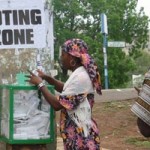 Crowdsourcing has been deployed in all manner of ways, with an increasing number of them being in political type applications. One of the more interesting is in monitoring elections. A recent paper has explored the impact such citizen based monitoring of elections has had on the whole process, and in particular on whether it ended up increasing voter turnout.
Crowdsourcing has been deployed in all manner of ways, with an increasing number of them being in political type applications. One of the more interesting is in monitoring elections. A recent paper has explored the impact such citizen based monitoring of elections has had on the whole process, and in particular on whether it ended up increasing voter turnout.
Their hypothesis was that such community based actions would have a beneficial impact on the reliability of elections, especially in areas where the official system was unable, or unwilling, to provide such a service.
“By leveraging the efficiencies found in small, incremental, digitally enabled contributions (an SMS text, phone call, email or tweet) to a public good (a more transparent election process), crowdsourced elections monitoring constitutes [an] important example of digitally-enabled collective action,” they state.
They go on to reveal how the crowdsourcing of electoral monitoring allowed information to be aired that might otherwise never have been so, and thus significantly improved the validity of the whole affair.
“The successful deployment of a crowdsourced elections monitoring initiative can generate information about a specific political process—information that would otherwise be impossible to generate in nations and geographic spaces with limited organizational and administrative capacity,” they say.
The study identified some 30,000 citizen generated reports of abuses and failures in the electoral system during the 2011 presidential elections in Nigeria. They found that the greater the involvement of citizens in validating the elections, the greater the turnout tended to be.
The researchers are at pains to point out that they can’t provide any accurate causation for this finding, as they didn’t measure voter motivations in any way, but they do suggest that using the crowd to monitor the elections freed up officials to do other things, such as man polling stations, which may also have helped with turnout figures.
They conclude that the enrollment of the crowd in ensuring the elections are fair and above board has generally speaking very few flaws. It also has some good insights for anyone looking to mobilize a group of people towards a collective goal. It would be great to see the study extended to other locations to see if similar results occur, and indeed to take in other crowd based verification efforts, such as in disaster relief projects. Hopefully the research will act as the catalyst for just that.